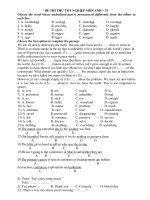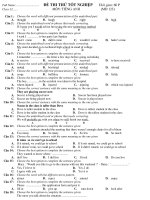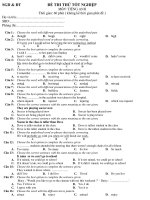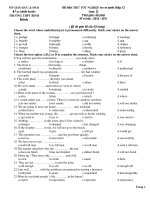đề thi thử tốt nghiệp môn Anh Văn
Bạn đang xem bản rút gọn của tài liệu. Xem và tải ngay bản đầy đủ của tài liệu tại đây (106.69 KB, 3 trang )
Choose the word or phrase (A. B. C or D) that best fits the blank space
1: A. teacher B. money C. return D. ruler
2: A. heat B. seat C. great D. meat
3: We are made all the cleaning in the house.
A. to do B. do C. doing D. done
4: I television a lot but I don't any more.
A. was watching B. was used to watch
C. used to watch D. have been watching
5: He to New York three times this year.
A. had been B. was C. is D. has been
6: I remember you somewhere before.
A. meet B. meeting C. met D. to meet
7: No one knows how many documents been lost.
A. has B. had C. have D. has had
8: If energy unlimited, many things in the world would be different.
A. is B. will be C. were D. would be
9: Mr. Brown has many patients he is always busy.
A. too/that B. very/until C. such/that D. so/that
10: The children, parents work late, are taken home by bus.
A. that B. whom C. whose D. their
11: She doesn't understand I am saying.
A. what B. that C. whose D. where
12: He wanted to know the reason I was late.
A. as B. for C. why D. because
13: We have to start early we won't be late.
A. so that B. that C. because D. because of
14: The place we spent our holiday was really beautiful.
A. what B. who C. where D. which
15: It me two hours to get home because of the traffic jam yesterday.
A. take B. spends C. took D.
spent
16: There are small between British and American English.
A. differences B. different C. difference D. differently
17: Some species of rare animals are in of extinction.
A. danger B. dangerous C. dangerously D. endanger
18: We are of the long journey.
A. tire B. tiring C. tired D. to tire
19: Sara speaks so that I can't understand her.
A. fast B. fastly C. faster D. fastest
20: Would you mind me a hand with this bag?
A. give B. giving C. to give D. to giving
21: is Oxford from Cambridge?
A. How long B. How far C. How long away D. How often
22: I’m only interesting in what he did.
23: We came late . A. because of the bad weather
B. because the bad weather
C. because of the badly weather D. because the badly weather
24: I didn't have an umbrella with me, so I got wet.
A. If I had had an umbrella, I wouldn't get wet.
B. If I had had an umbrella, I would get wet.
C. If I had had an umbrella, I wouldn't have got wet.
D. If I had had an umbrella, I would have got wet.
25: Jane is a better cook than Daisy.
A. Daisy can't cook as good as Jane. B. Daisy isn't a cook as good as Jane.
C. Daisy can cook as badly as Jane. D. Daisy can't cook as well as Jane.
26: A. churches B. chairman C. chemist D. changes
27: I am worried taking my final exam.
A. that B. of C. to D. about
28: Basketball has become increasingly popular from 1891.
A B C D
29: The problem is difficult to solve.
A. It is difficult problem to solve. B. It is a problem difficult solve.
C. It is difficult to solve the problem. D. It is difficult solve the problem.
The Korean education system basically consists of primary schools, (30) schools, high
schools, and colleges (31) universities, with graduate courses leading to Ph.D.degrees
(32) education is compulsory for children aged six (33) eleven. The basic primary
school curriculum is generally divided into eight (34) : the Korean language, social
studies,
science, (35) , ethics, physical education, music and fine arts. Students in secondary
schools are required to take a number (36) additional subjects, such as English, and
can take electives, (37) as technical or vocational courses. Afterwards, students can
(38) between general education and vocational high schools. (39) general, high
school tends to be strict, as college and university admission is very competitive.
30: A. second B. secondary C. among D. half
31: A. as B. or C. but D. so
32: A. Primary B. High C. College D. University
33: A. from B. for C. with D. to
34: A. subjects B. courses C. topics D. titles
35: A. mathematician B. mathematics C. mathematically D. mathematical 36:
A. of B. with C. for D. to
37: A. so B. such C. like D. alike
38: A. choose B. test C. wish D. consist
39: A. On B. In C. Of D. For
40: I was listening to the radio last night when the door bell rings.
41: Susan is looking for something .
A. eat B. to eating C. to eat D. eating
42: We need more sugar. There is sugar in the pot.
A. much B. many C. any D. little
43: We had better to review this chapter carefully.
44: My father is a . He works in a garage.
A. farmer B. mechanic C. teacher D. doctor
45: Don't the door. The paint is still wet.
A. touch B. leave C. keep off D. watch
David Hempleman Adams is an explorer and adventurer. In April 1984, he walked through
northern Canada to the North Pole. He walked 400 kilometres in 22 days. He was 27 years old
when he did it. David was the first person to walk to the North Pole by himself. Other people
travelled to the North Pole before David but they had a sled and a dog team. David didn't have
a dog team. David
was a brave man to go on this adventure on his own. He was also a lucky man because the
bear and the icy water didn't kill him.
46: Which of the following best expresses the main idea of the passage ?
A. David drove to the North Pole. B. No one travelled to the North Pole before David.
C. David was the first person to walk to the North Pole alone.
D. It was very cold in the North Pole.
47: David travelled to the North Pole with .
A. a group of people B. a dog team C. another person D. nobody
48: Which of the following is NOT true?
A. He was killed by the bear. B. He walked to the North Pole alone.
C. He walked 400 kilometres.
D. He was 27 years old when he travelled to the North Pole.
49: The phrase "by himself" can be replaced by .
A. alone B. successfully C. with other people D. on foot
50: Which of the following is the best title of the passage?
A. A Lucky Man B. A Walk to the North Pole C. Without a Dog Team D. Icy Water









